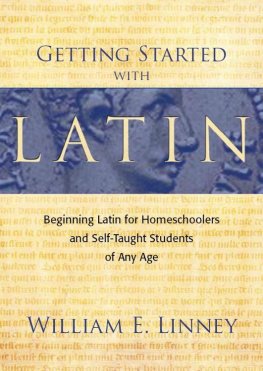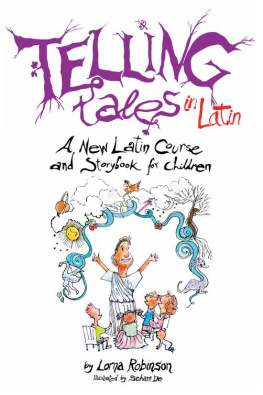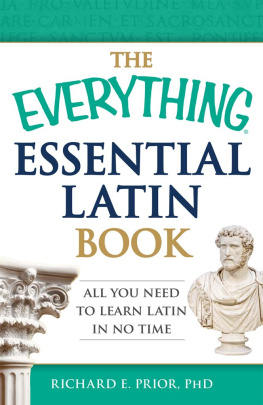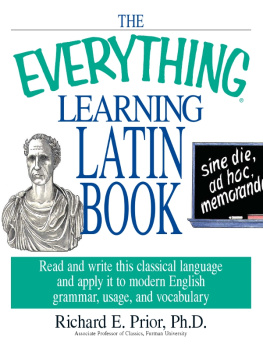GETTING STARTEDWITH LATIN
Beginning Latin for Homeschoolers and Self-Taught Students of Any Age
WILLIAM E. LINNEY
ARMFIELD ACADEMIC PRESS
Getting Started with Latin
Beginning Latin for Homeschoolers and Self-Taught Students of Any Age
Copyright 2007 by William E. Linney III
All rights reserved. No part of this book may be used or reproduced by any means, graphic, electronic, or mechanical, including photocopying, recording, taping or by any information storage retrieval system without the written permission of the publisher.
ARMFIELD ACADEMIC PRESS
www.armfieldacademicpress.com
Editorial consultant: Ellen Correll
Editorial consultant: Sara Beatty
Editorial assistant: Geraldine Linney
Cover design: Janet Bergin
The image used to create the cover art for this book was provided courtesy of
Classical Numismatic Group, Inc.
Specializing in ancient Greek, Roman, Persian, Celtic, Byzantine, Jewish, Biblical, early Indian, British, European medieval, and Renaissance coins and related reference books
www.cngcoins.com
Kindle ISBN: 978-0-9795051-6-4
ePub ISBN: 978-0-9795051-7-1
IN MEMORIAM DR. CHARLOTTE HOGSETT
Gratias tibi ago
CONTENTS
LIST OF LATIN EXPRESSIONS
PREFACE
Latin has fascinated and challenged me ever since my mother made me sign up for it in the tenth grade. From the first day of class I was intrigued by the way Latin words fit together like pieces of a puzzle. My interest was also stirred when I began to notice that a great number of English words come directly from Latin words. So even from the beginning, I had a strong appreciation for the Latin language. But at that young age I was unable to foresee the many ways in which Latin would enrich my life. Over the years my admiration of this language has continued to grow. And, with the added perspective that comes with getting older, I have a much deeper appreciation not only of the Latin language, but of education in general.
Consequently, when my sister asked me to teach beginning Latin to her two homeschooled children, I was delighteduntil I remembered that my two prospective students would be on their own most of the time because of the great distance separating us. After giving it some thought, I realized that having the right textbook would be crucial in a situation like this. I began to search for the perfect beginning Latin method. As I searched, I pictured in my mind a book that would:
- Be self-explanatory, self-paced, self-contained and inexpensive
- Allow the student to make progress with or without a Latin teacher
- Provide plenty of practice exercises after each new concept so the student can master each idea before moving on to the next one
- Avoid making beginning Latin any more difficult than it actually is
However, after examining many books, I reluctantly admitted to myself that the book I had pictured in my mind did not exist. Therefore, because I was completely ignorant of how difficult it is to write a book, I set out to write my own beginning Latin method.
Getting Started with Latin was created to meet the unique needs of homeschooled and self-taught students. I designed this book to meet not only my criteria, but the recommendations of several experienced homeschool mothers. They urged me to make my beginning Latin method completely self-contained, with no extra materials to purchase (such as pronunciation tapes, answer keys or teachers editions). They even asked that the book be in a large format to make it easier to use, as well as non-consumable so they could use it with multiple children. I have tried to accommodate these and other requests by putting the answer key in the back of the book and by providing free pronunciation recordings, available for download at www.gettingstartedwithlatin.com.
In this method, new words and concepts are introduced in a gradual yet systematic fashion. Each lesson provides many exercises for practicing the new material while reviewing material from previous lessons. And, just to make things interesting, every once in a while you will run into a page entitled Latin Expressions . These brief and often humorous commentaries will explain the meanings of the Latin sayings you have seen for years but never had a clue as to their meaning.
Getting Started with Latin makes beginning Latin accessible by gently lifting the student over some of the obstacles that can make Latin seem out of reach. Because this book moves so gradually, students probably will not say, This is too hard for me. I quit! Instead, these bite-size lessons should leave the student encouraged and ready to move forward all the way to the end of the book. But when you do finish this book, dont let your Latin studies end there. This book only covers the beginning stages of Latin grammar. I am confident that if this book causes you to grasp the beauty and power of Latin, even in some small way, you will have no trouble finding the motivation to continue your studies at the next level.
William E. Linney
HOW TO USE THIS BOOK
This book is structured around one main teaching method: Teach one concept at a time and let the student master that concept before introducing the next one. With that in mind, read the tips listed below to help you use this book to the greatest advantage.
THE NEW WORD
Start each lesson by observing the new word for that particular lesson. All Latin words in this book are in bold print so they will be easy to recognize. The meaning of the new word is in italics . In some lessons you will learn a new concept and in others you will simply review material from previous lessons.
PRONUNCIATION
The best way to learn correct pronunciation is by listening and copying what you hear. Visit www.gettingstartedwithlatin.com to download the free pronunciation recordings in MP3 format. In these recordings, each new word and exercise is read aloud by the author. You may listen to them on your computer or put them on a CD and listen to them on any CD player. Choose from either classical or ecclesiastical (church) pronunciation recordings. Either way, these free audio recordings will help you to achieve proper Latin pronunciation. And, as you improve, you will be able to translate the exercises as you hear them read aloud by the author.
Occasionally, there will be a written pronunciation tip at the beginning of a particular lesson. These tips are included in the book to prevent some of the most common pronunciation errors. These written pronunciation tips explain how a word will be pronounced in both classical and ecclesiastical style. To further assist you in achieving proper pronunciation, there is a classical pronunciation chart on page 201 and an ecclesiastical pronunciation chart on page 202 for the sake of reference.
Many of the homeschool mothers I have met and worked with seem to be very concerned about Latin pronunciation. They are worried that they will somehow cause permanent damage to their childs intellect if they mispronounce Latin vowels or if they choose to emulate the wrong style of pronunciation. Please allow me to address this issue: Classical pronunciation is the style of pronunciation used in the Latin departments of most colleges and universities. Latin scholars use this type of pronunciation because it is supposed to reflect accurately the way Latin was pronounced by the ancient Romans. Ecclesiastical (church) pronunciation, on the other hand, is the style of pronunciation used by the Roman Catholic Church. Roman Catholic students may want to employ this type of pronunciation because they may have the opportunity to use it in the recitation of prayers or in other religious activities.
Regardless of which pronunciation style you choose, please dont lose any sleep over it. Of course you should do your best to pronounce the words correctly. But please remember that if you do mispronounce a word, you will not ruin your childs education. And, the Latin Police will not come to your home and arrest you.







